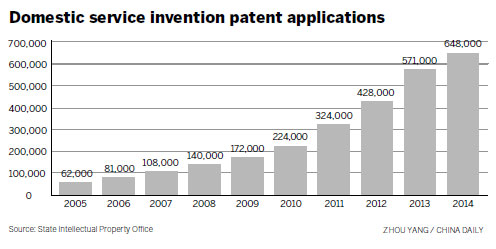
New draft rule on patent rewards draws support(2)
Song Jianhu, director of the State Intellectual Property Office's law and treaty department, agreed with Yan.
"In terms of innovation, inventors and companies are mutually dependant on each other. We have considered a balance between the interest of companies and that of inventors," Song said.
The concept of a service invention is not new in China - the 1984 edition of Patent Law has related regulations, she added.
Yet the work on drafting the regulation on service invention began in 2010 when China released its outline for the national long- and middle-term professional development plan.
The regulations under discussion provide insight into the increasing value of professionals, analysts said.
"We can see that the idea behind the legislation is tilting in favor of inventors' interests," said Yang, the president of the All-China Patent Attorneys Association.
"I believe it helps inspire tech company's employees to make innovations, which is in line with the country's goal of promoting inventions and encouraging innovation," he said.
The new draft will have a greater impact on large corporations, which by way of their sheer size, will likely have a higher number of inventions and thus, a greater amount of financial rewards to dole out.
Yan at Huawei said he believes financial rewards as stated in the draft rule are high compared with what judges would likely hand down in compensation cases in court.
He cited an infringement compensation survey conducted by the Zhongnan University of Economics and Law that found that 97.25 percent of infringements resorted to legal proceedings and granted an average of 80,000 yuan in compensation between 2008 and 2012 in China.
The average compensation was $4.9 million in the United States from 2007 to 2012, according to a third-party report, he said.
"If we could also be granted such a high compensation for damage in court, none would consider the suggested rewards in the draft excessive."
